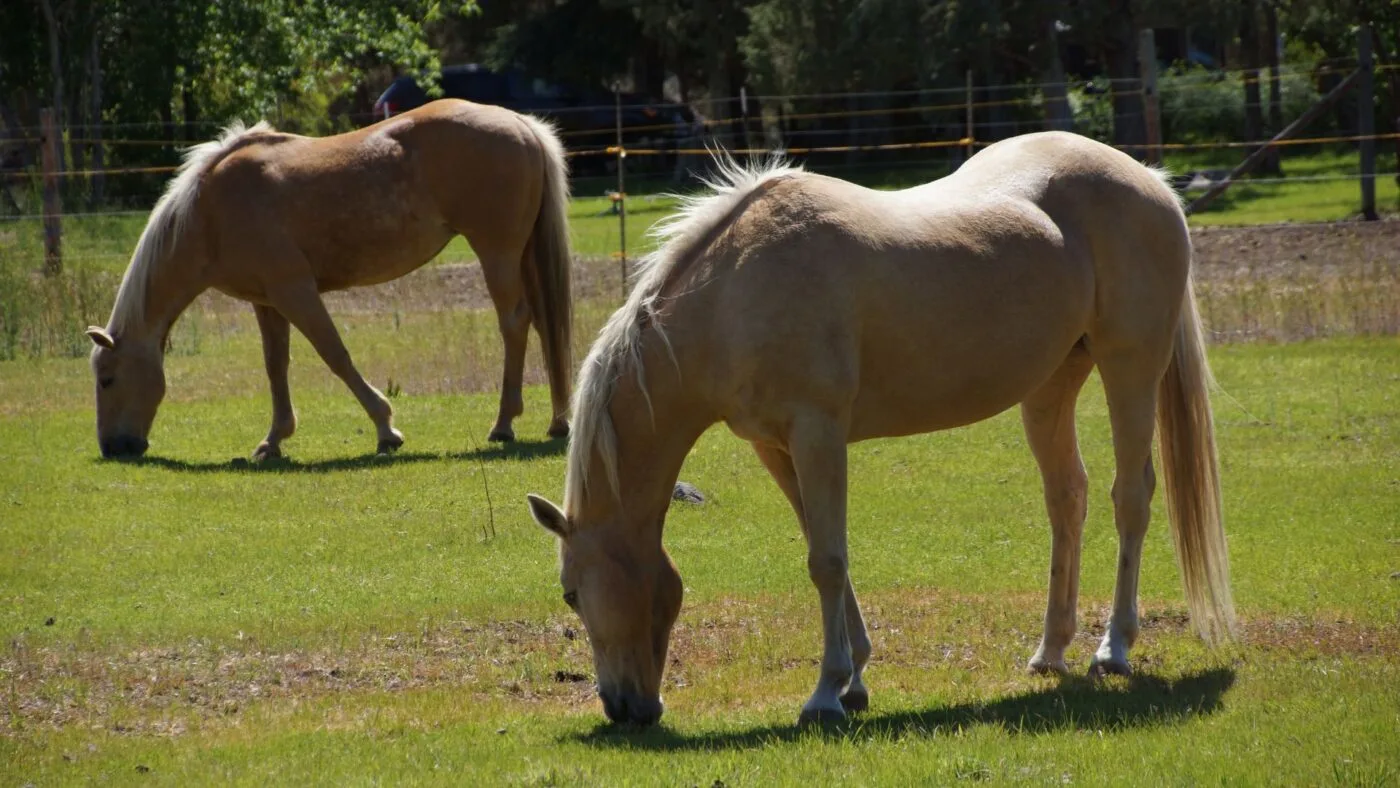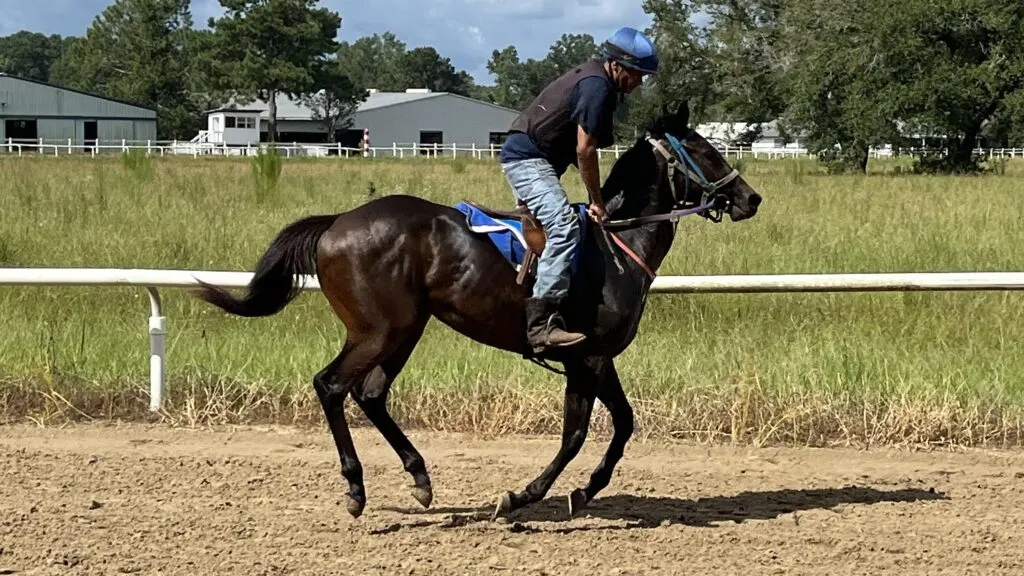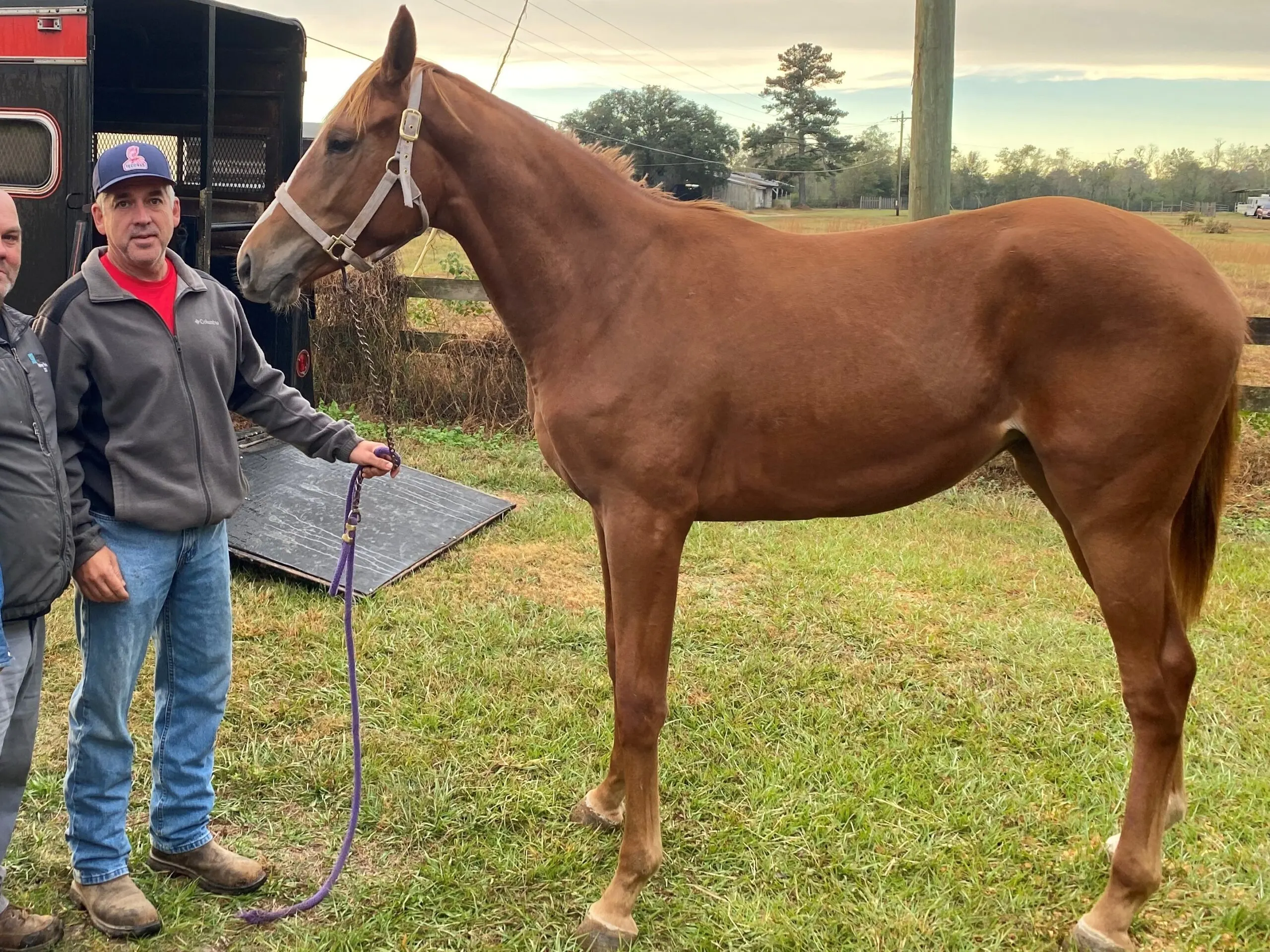Last updated: April 15, 2024
The weight of a horse varies widely depending on the breed, age, and health. On average, an adult horse weighs between 900 and 2,200 pounds. Miniature horses and small ponies can weigh as little as 200 pounds, while large draft breeds like Belgians, Percherons, and Clydesdales can tip the scales at over 2,000 pounds.
As a lifelong horse owner with extensive experience managing equine weight issues, I understand the importance of a horse’s weight; it’s not just a number; it’s a vital indicator of their health, diet, and overall well-being. In this guide, we’ll delve deep into how much horses weigh, why it’s crucial to maintain a healthy weight, and how to accurately measure and manage it.

How Much Does an Adult Horse Weigh?
Pinpointing the exact weight of an adult horse can be challenging due to the numerous factors that influence it. Let’s look at some of these factors:
Key Influences:
- Factors: Breed, health, nutrition.
- Average Weight: 900 to 1,200 pounds.
Breed Variations:
- Miniature Horses/Ponies: 100 to 600 pounds.
- Draft Horses: Over 1,800 pounds (e.g., Belgians, Percherons, Clydesdales).
Insights for Care: Understanding the weight range is crucial for customized care and nutrition plans, ensuring each horse receives the attention it needs for optimal health and well-being.

How Much Does a Foal Weigh?
- Average Newborn Foal Weight: About 100 pounds (45 kilograms), or 10% of the mare’s weight.
- Comparison Across Mammals: Ranges from bats (25%-35% of the mother’s weight) to pandas (0.1% of the mother’s weight).
Breed Variations:
- Thoroughbred Foals: Approximately 10% of their mature weight at birth.
- Draft Horse Foals: About 7% of their adult weight when born.
- Shetland Pony Foals: They can be as much as 13% of their mature weight, maturing faster than larger breeds.
Factors Influencing Foal Size:
- Mare’s Age: Foals from mares aged 7-11 tend to be larger.
- Mare’s Birthing History: Mares with previous births usually have larger foals.
- Mare’s Size: Larger mares generally give birth to larger foals.
Growth Milestones:
- 6 Months: Thoroughbred foals reach 43% of their mature weight and 83% of their mature height.
- Seasonal Variation: Winter-born foals are initially smaller but catch up by five months.
- 12 Months: Foals are at 61% of their adult weight and 92% of total height.

How Much Do Horses Weigh by Breed?
Each horse breed has a different average weight, contributing to its specific role and lifestyle. Let’s take a closer look at some of these common breeds’ typical weight ranges.
- Thoroughbred:
- Average Weight: 1,000 to 1,200 pounds
- Notable Insight: Bred for racing, their lean and athletic build contributes to their lighter weight compared to other breeds.
- Clydesdale:
- Average Weight: 1,800 to 2,200 pounds
- Unique Aspect: Known for their impressive size and strength, Clydesdales are often heavier due to their muscular build and large bone structure.
- Arabian:
- Average Weight: 800 to 1,000 pounds
- Research Finding: Despite their lighter weight, Arabians are renowned for their endurance, a trait that has been selectively bred over centuries.
- Quarter Horse:
- Average Weight: 950 to 1,200 pounds
- Interesting Fact: Quarter Horses are versatile and muscular, known for their ability in short sprints, contributing to their moderate weight.
- Shetland Pony:
- Average Weight: 400 to 450 pounds
- Highlight: One of the smallest horse breeds; their weight reflects their compact and sturdy physique, ideal for their initially intended work in the Shetland Isles.
- Belgian Draft:
- Average Weight: 1,800 to 2,200 pounds
- Insight: As one of the strongest horse breeds, their significant weight is a result of their role in heavy farm work and pulling.
- Andalusian:
- Average Weight: 900 to 1,100 pounds
- Historical Note: Originating from Spain, their elegant yet robust build reflects a history of both farm work and classical dressage.
- Appaloosa:
- Average Weight: 950 to 1,200 pounds
- Characteristic: Known for their distinctive spotted coat, Appaloosas have a balanced weight that suits their versatility in various equestrian disciplines.
Here is the bar chart illustrating the average weights of common horse breeds:
Note to Readers: For those interested in more detailed information, at the end of this article, you’ll find comprehensive tables listing various horse breeds along with their average weights.

Horse Weight Management
Understanding the nuances of horse weight is essential for their health and performance. Let’s dive into the key elements that play a pivotal role in determining a horse’s weight, combining insights on breed variations, age, diet, activity level, and health considerations into one cohesive section.
Breed and Age:
- Breed Variations: Horse breeds significantly vary in weight, with miniature horses and ponies on the lighter end of the scale, and draft breeds like Belgians and Clydesdales being much heavier.
- Age: Younger, growing horses have different nutritional and care needs compared to mature or elderly horses, affecting their weight and overall health.
Diet – The Foundation of Weight Management:
- Quality of Feed: High-quality, nutrient-rich feed is crucial. It supports healthy weight maintenance, impacting both underweight and overweight horses.
- Quantity and Frequency: Balancing the amount of feed and the frequency of meals is essential to avoid obesity or malnutrition, tailored to each horse’s specific needs and lifestyle.

Exercise – Vital for Maintaining Healthy Weight:
- Activity Level: A horse’s caloric intake should align with their activity level. Active horses, such as those used in racing or competitive sports, require more calories, while leisure or sedentary horses need less to maintain an optimal weight.
- Type of Exercise: Different disciplines affect a horse’s physique differently. Tailoring exercise programs to match the horse’s breed, age, and health status ensures they stay fit and healthy.
Health Conditions Impacting Weight:
- Regular health checks can uncover issues affecting weight. Conditions like dental problems, Cushing’s disease, or parasitic infections can lead to significant weight loss or gain, emphasizing the importance of comprehensive care.
Practical Tools for Monitoring Weight:
- Weight Tapes and Body Condition Scoring: These tools provide a practical way to monitor weight changes and adjust care plans accordingly.
- Veterinary Assessments: Regular check-ups with a veterinarian help track a horse’s health status, adjusting diet and exercise plans to meet their changing needs.
By considering these interconnected factors, horse owners and caretakers can develop a holistic approach to weight management, ensuring horses not only achieve but maintain a healthy weight throughout the different stages of their lives.

Insights from Scientific Research on Horse Weight
Exploring the Complexities of Equine Weight Management:
- Study Focus: A pivotal 2013 research project by Metcalfe and colleagues investigated reasons behind unexplained weight loss in horses, despite adequate nutrition.
- Critical Discoveries: The importance of thorough health and body condition monitoring was underscored, identifying low protein levels as potential red flags for serious health conditions. This highlights the necessity for veterinarians to evaluate both the physical and internal health indicators to accurately address weight issues.
- Reference: Metcalfe, L. V. A., More, S. J., Duggan, V., & Katz, L. M. (2013). “A retrospective study of horses investigated for weight loss despite a good appetite (2002-2011).” Equine Veterinary Journal, 45(3), 340-345.
Takeaway: Balancing a horse’s weight is intricately linked to their diet, activity level, and comprehensive health monitoring. The integration of scientific research into everyday care practices underscores the multifaceted approach needed for optimal equine health management.



Why Horse Weight Matters:
- Overall Well-being: Weight is a crucial indicator of health and wellness.
- Health Monitoring: Identifies potential health issues early on.
- Dietary Management: Ensures a diet that meets nutritional needs without risking obesity or malnutrition.
- Training and Performance: Influences stamina, agility, and speed.
- Medication Dosage: Ensures accurate dosing for effectiveness and safety.
Horse Weight Estimator
Enter the heart girth and body length of the horse to estimate its weight:
Check out this YouTube video to learn how to determine your horse’s weight using a measuring tape.
Case Studies
Case Study 1: Soldier Boy – A Thoroughbred’s Journey to Optimal Weight
“Soldier Boy,” a 4-year-old Thoroughbred, faced inconsistent racing performance, initially suspected to be training-related. Further investigation revealed significant weight fluctuations as the culprit.
Action:
- Implemented regular weight monitoring to track changes.
- Made dietary adjustments, introducing higher-quality forage and beet pulp, aligning his diet more closely with his energy needs.
- Allowed more turnout time, promoting natural movement and stress reduction.
These steps led to stabilized weight and improved performance, underscoring weight management’s role in equine athleticism.
This case highlights how weight management directly impacts a performance horse’s success, linking to the importance of understanding “how much a horse weighs” for optimal care and performance.
Have you experienced similar challenges with your horse? Share your story or questions below.

Case Study 2: Majesty – Managing Weight in an Elderly Horse
“Majesty,” a 20-year-old Arabian, faced concerning weight loss and a drop in vitality.
Approach:
- Health Evaluation: Started with a comprehensive health check to identify underlying issues contributing to weight loss.
- Dietary Adjustments: Shifted to high-quality forage and specialized senior feed, addressing nutritional needs specific to his age.
- Regular Monitoring: Bi-weekly weight checks helped track Majesty’s progress, adjusting his diet to ensure optimal health.
These targeted actions steadily improved Majesty’s weight and overall vitality, highlighting the importance of personalized care for elderly horses.
Majesty’s journey illustrates the critical role of diet and regular health monitoring in maintaining the weight and wellness of older horses. It emphasizes that knowing and managing a horse’s weight is pivotal for their health and happiness at every life stage.
Do you have an elderly horse with similar challenges? Share your experiences or tips for managing their weight and health.

FAQs on Horse Weight
How much does a full-grown horse weigh?
The weight of a full-grown horse can vary greatly depending on its breed, size, and overall health. On average, an adult horse might weigh anywhere from 900 to 1,200 pounds.
Can a horse weigh 3000 pounds?
Yes, a horse can weigh 3000 pounds, but it’s extremely rare. Only the largest draft breeds, like the Shire or Belgian horses, might reach this weight under specific circumstances, such as exceptional size or obesity.
What factors affect a horse’s weight?
A horse’s weight is influenced by breed, age, diet, and activity level. Breed-specific variations significantly affect weight, with some breeds naturally larger or smaller than others. Age impacts metabolic needs and growth patterns, while diet and exercise play key roles in maintaining a healthy weight.
How can I tell if my horse is at a healthy weight?
A horse’s body condition score (BCS) is a reliable method to determine if they are at a healthy weight. The BCS assesses fat deposition in key areas of the horse’s body on a scale from 1 (emaciated) to 9 (obese), with an ideal range being 4-6 for most breeds.
How often should I weigh my horse?
Regularly monitoring your horse’s weight is important for the early detection of health issues. While daily weighing isn’t necessary, a consistent schedule—such as monthly checks—can help track weight changes and adjust care as needed.

Conclusion: Key Takeaways in How Much Does a Horse Weigh?
In conclusion, navigating through the diverse factors that influence a horse’s weight reveals a complex yet fascinating aspect of equine care. From breed-specific variations and the impact of age to the roles of diet and activity level, each element plays a crucial part in determining how much a horse weighs.
This journey not only answers the initial query—”How much does a horse weigh?”—but also emphasizes the importance of understanding these factors for anyone involved in the care, training, or study of horses.
I encourage you to delve deeper into this subject, engage with the equine community, and share your experiences and insights. Your involvement can contribute to a broader understanding and appreciation of these magnificent animals, enhancing the well-being of horses everywhere.

Horse Weight by Type and Breed
Average Weight of Horses by Type
| Horse type | Average weight |
|---|---|
| Cold blood (Draft Horses) | 1,500 to 2,200 pounds (680.38 – 997.90 kg) |
| Hot blood (Light horses) | 800 to 1,500 pounds (362.87 – 680.38 kg) |
| Warmbloods (Sport Horses) | 1250-1450 pounds ( 567-657.70 kg) |
| Miniature | 100 to 350 pounds (45.35 – 158.75 kg) |
| Average horse weight | 1,000 pounds (453.59 kg) |
Average Horse Weight: Draft Horse Breeds
| Draft Horse breed | Average weight |
|---|---|
| Clydesdale | 1,900 pounds (861.82 kg) |
| Percheron | 1,950 pounds (884.50 kg) |
| Belgian | 2,000 pounds (907.18 kg) |
| Suffolk Punch | 1,900 pounds (861.82 kg) |
| Shire | 2,000 pounds (907.18 kg) |
| Ardennes | 1,800 pounds (839.14 kg) |
| Worlds Largest Horse (Shire) | 3,359 pounds (1523.61 kg) |
Average Horse Weight: Warmblood Breeds
| Horse Breed | Weight |
|---|---|
| Irish Draught | 1,300 pounds (589.67 kg) |
| Holsteiner | 1,400 pounds (635.02 kg) |
| Hanoverian | 1,400 pounds (635.02 kg) |
| Dutch Warmblood | 1,430 pounds (648.63 kg) |
| Danish Warmblood | 1,200 pounds (544.31 kg) |
| Oldenburg | 1,500 pounds (680.5 kg) |
| Westphalian | 1,320 pounds (599 kg) |
| Trakehner | 1,200 pounds (544.31 kg) |
| Friesian | 1,200 pounds (544.31 kg) |
| Selle Français | 1,300 pounds (589.67 kg) |
| Irish Cob Horses | 1,300 pounds (589.67 kg) |
| Andalusian | 1,200 pounds (544.31 kg) |
| Lipizzaner | 1,150 pounds (521.63 kg) |
| Lusitano | 1,400 pounds (635.02 kg) |
| Wielkopolski Horse (Polish Warmblood | 1250 pounds(566.99 kg) |
| Swedish Warmblood | 1025 pounds (464.93 kg) |
| American Warmblood | Weights vary greatly |
Average Horse Weight: Hot Blood Breeds
| Horse Breed | Average Weight |
|---|---|
| Arabian | 900 pounds (408.23 kg) |
| Thoroughbred | 1,100 pounds (498.95 kg) |
| American Quarter Horse | 1,000 pounds (453.5 kg) |
| Akhal-Teke | 900 pounds (408.23 kg) |
| American Paint Horse | 1,000 pounds (453.5 kg) |
| Paso Fino | 850 pounds (385.55 kg) |
| Standardbred | 950 pounds (430.91 kg) |
| American Saddlebred | 1,000 pounds (453.5 kg) |
| Hackney Horse | 1,000 pounds (453.5 kg) |
| Mustang | 900 pounds (408 kg) |
| Haflinger | 850 pounds (385.55 kg) |
| Missouri Fox Trotter | 1,050 pounds (476.272 kg) |
| Tennessee Walker | 1,100 pounds (498.95 kg) |
| Morgan | 950 pounds (430.91 kg) |
| Polo Pony | 1,050 pounds (476.272 kg) |
| Fjord | 950 pounds (430.91 kg) |
Meet Miles Henry
An avid equestrian and seasoned racehorse owner, Miles Henry brings his extensive experience to the equine world, proudly associating with the AQHA, The Jockey Club, and various other equine organizations. Beyond the racetrack, Miles is an accomplished author, having published various books about horses, and is a recognized authority in the field, with his work cited in multiple publications.
🔗 Connect with Miles:
Twitter
Facebook
YouTube: Check out race highlights, horse care tips, and more!

